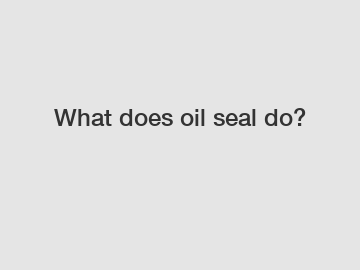What does oil seal do?
In the world of machinery, there are countless components working in unison to ensure smooth operation and longevity. Amidst these crucial parts sits an often-underappreciated hero: the oil seal. While its name may not elicit much excitement, this little device plays a pivotal role in maintaining the efficiency, reliability, and overall performance of various industrial systems. Join us as we delve into the world of oil seals, uncovering their significance, functions, and the incredible impact they have on machinery.
Section 1: Unveiling the Basics of Oil Seals.
Oil seals, also known as shaft seals, are mechanical devices designed to stop the leakage of lubricants, such as oil or grease, while preventing the entry of contaminants into machinery. They create a protective barrier between moving components, ensuring a sealed environment that keeps vital fluids inside and unwanted particles outside.

Section 2: Understanding the Significance of Oil Seals.
2.1 Enhanced Performance and Efficiency:
Oil seals are crucial for maintaining peak performance and efficiency. By preventing lubricant leakage, these seals ensure that machinery stays properly lubricated, reducing friction and wear between components. This ultimately helps in minimizing energy losses and extending the lifespan of various mechanical parts.
2.2 Contamination and Environmental Protection:
Oil seals play a vital role in protecting machinery from harmful contaminants such as dirt, dust, and moisture. By sealing off critical components, they prevent these particles from infiltrating sensitive areas, safeguarding the machinery's performance, and avoiding potential breakdowns.
2.3 Preservation of Lubricants:
Efficient lubrication is key to preventing the overheating and premature failure of delicate machinery. Oil seals act as a sealant, preventing lubricants from escaping and preserving their integrity, ensuring optimal performance and reducing the need for frequent maintenance.
Section 3: The Inner Workings of an Oil Seal.
3.1 Construction:
Oil seals are typically made of durable synthetic rubber-like materials such as nitrile or Viton®, chosen for their resistance to heat, fluids, and general wear and tear. They usually consist of an outer metal casing, an inner sealing lip, and a spring. The spring provides the necessary force to ensure the sealing lip maintains contact with the rotating shaft.
3.2 Installation:
Proper installation of oil seals is pivotal for their effective functioning. They are typically positioned in a designated housing or bore, with the sealing lip facing the shaft. The seal is then secured in place, providing a tight fit that ensures a reliable seal for the entire service life.
Section 4: The Importance of Regular Maintenance.
4.1 Monitor for Leakage:
Regular inspection of oil seals is crucial to detect any signs of leakage promptly. Leaks indicate a compromised seal, which can lead to lubricant loss, reduced efficiency, and potential machinery malfunctions.
4.2 Replace as Needed:
As with any mechanical component, oil seals deteriorate over time. Timely replacement is essential to maintain optimal performance and prevent costly breakdowns. It's crucial to adhere to manufacturer guidelines for recommended replacement intervals.
Section 5: Oil Seals in Various Applications.
5.1 Automotive Industry:
Oil seals are extensively used in vehicles for sealing various components, including camshafts, crankshafts, and wheel hubs. They prevent the leakage of engine oil and keep contaminants at bay, ensuring efficient operation and extended component life.
5.2 Industrial Machinery:
From manufacturing equipment to agricultural machinery, oil seals find their place in a wide range of industrial applications. They provide protection against contaminants and maintain lubrication in critical components, such as pumps, gearboxes, and hydraulic systems.
Section 6: Conclusion.
In the intricate realm of machinery, oil seals are the unassuming yet vital guardians that ensure components operate smoothly and efficiently. By creating a secure and sealed environment, these remarkable devices prevent unwanted leakage and contamination, preserving lubrication and extending the overall lifespan of machinery.
So, the next time you encounter a well-functioning machine or vehicle, take a moment to appreciate the silent hero that is the oil seal, quietly working behind the scenes to keep everything running smoothly.
For more China Oil Seal Manufacturers, china farm machinery oil seal manufacturer, NBR TC Rubber Oil Sealsinformation, please contact us. We will provide professional answers.

Comments
0